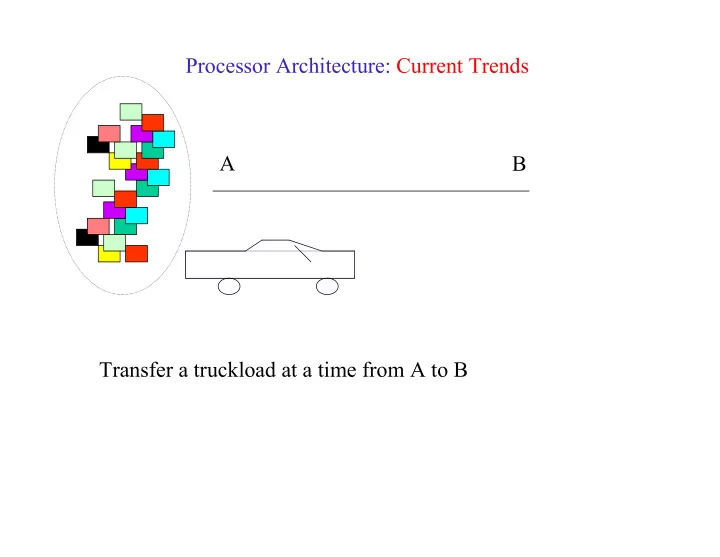

Processor Architecture: Current Trends A B Transfer a truckload at a time from A to B
Processor Architecture: Current Trends A B Make it more powerful Faster: Engine, Lighter, Wheels, ….. Bigger: More work per trip
Processor Architecture: Current Trends A B Evolutionary improvements in technology reach their limit Frequency Make it more powerful Power Pipeline depth Faster: Engine, Lighter, Wheels, …. Bigger: More work per trip. Insufficient work
Processor Architecture: Current Trends • Instruction Level Parallelism (ILP) Concurrency between instructions in a single program Application is oblivious to underlying parallelism • Hardware mechanisms and compiler optimizations Simple Instruction Pipelining Advanced Pipelining Techniques Superscalar and VLIW architectures Inflection Point: Current ILP-based designs have reached a plateau • Power Wall • Memory Wall • Implicit Parallelism Wall •
Processor Architecture: Current Trends A B Get a fleet of trucks Increase Throughput Rate of package delivery
Processor Architecture: Current Trends A B Multiple cores on a chip Get a fleet of trucks Cores are simple Great if coordination between cores is small
Processor Architecture: Current Trends • Explicit Parallelism Software ( application, compiler, run-time) aware of parallelism Data Level Parallelism (DLP) • Identical operations on elements of large arrays (vectors) Vector or Array Processors GPUs Thread Level Parallelism (TLP) • Applications with multiple cooperating or independent threads Multithreaded Processors Chip Multiprocessors Process Level Parallelism • Scalable Multiprocessors, Clusters (Established technology) Application Level Parallelism • • Virtualization, Cloud Computing?
Processor Architecture: Current Trends A B Move a single package from A to B Having multiple trucks does not help Task cannot be obviously parallelized High Performance Scalar Processor Interested in reducing the time for a non-decomposable task Reduce Latency
Memory Subsystem • Memory Hierarchy is key to performance • Latency Hiding • Caching principles Cache organization Multi-level caching • Virtual Memory • Interaction of Caching and Virtual Memory • Multiprocessor Cache Coherence • Memory Consistency
I/O Subsystem Storage : Evolution from Systems to Service • Direct or Server-Attached Storage: • • Storage devices : Disk Drives, SSDs, MEMS … • Interconnect protocols (IDE, SATA, SCSI, ..) Networked Storage • • Storage Arrays • Array Virtualization • Storage Area Networks (SAN), Networked Attached Storage (NAS) • Protocols: Fiber Channel, iSCSI, RDMA Fault Tolerance: • • RAID Arrays, Replication, Erasure Codes for Multiple errors Storage as a Service: Amazon S3, Google G-Drive, Apple, … • • Isolation and Performance Guarantees Interconnect • Bus systems • Point-to-point interconnect • Switched fabrics • Cluster interconnects •
Recommend
More recommend